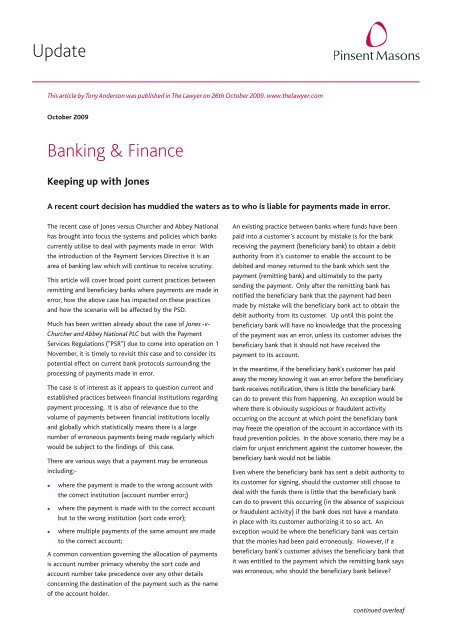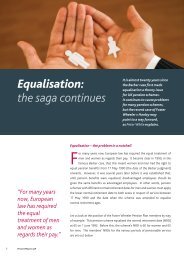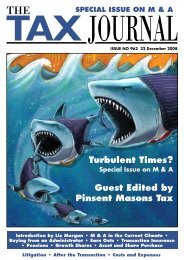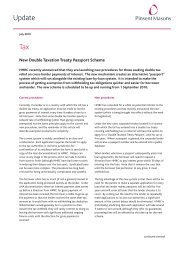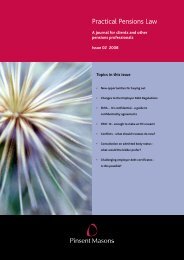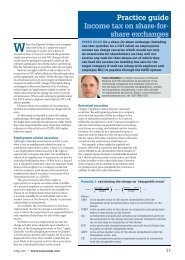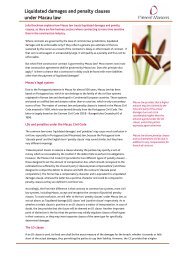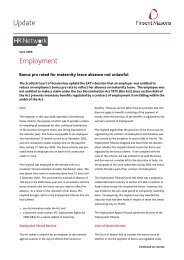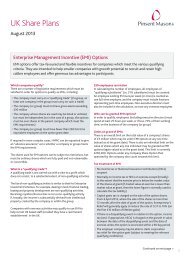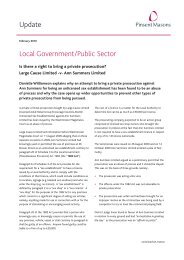Article - Keeping up with Jones - Nov 09.qxd - Pinsent Masons
Article - Keeping up with Jones - Nov 09.qxd - Pinsent Masons
Article - Keeping up with Jones - Nov 09.qxd - Pinsent Masons
You also want an ePaper? Increase the reach of your titles
YUMPU automatically turns print PDFs into web optimized ePapers that Google loves.
Update<br />
This article by Tony Anderson was published in The Lawyer on 26th October 2009. www.thelawyer.com<br />
October 2009<br />
Banking & Finance<br />
<strong>Keeping</strong> <strong>up</strong> <strong>with</strong> <strong>Jones</strong><br />
A recent court decision has muddied the waters as to who is liable for payments made in error.<br />
The recent case of <strong>Jones</strong> versus Churcher and Abbey National<br />
has brought into focus the systems and policies which banks<br />
currently utilise to deal <strong>with</strong> payments made in error. With<br />
the introduction of the Payment Services Directive it is an<br />
area of banking law which will continue to receive scrutiny.<br />
This article will cover broad point current practices between<br />
remitting and beneficiary banks where payments are made in<br />
error, how the above case has impacted on these practices<br />
and how the scenario will be affected by the PSD.<br />
Much has been written already about the case of <strong>Jones</strong> -v-<br />
Churcher and Abbey National PLC but <strong>with</strong> the Payment<br />
Services Regulations ("PSR") due to come into operation on 1<br />
<strong>Nov</strong>ember, it is timely to revisit this case and to consider its<br />
potential effect on current bank protocols surrounding the<br />
processing of payments made in error.<br />
The case is of interest as it appears to question current and<br />
established practices between financial institutions regarding<br />
payment processing. It is also of relevance due to the<br />
volume of payments between financial institutions locally<br />
and globally which statistically means there is a large<br />
number of erroneous payments being made regularly which<br />
would be subject to the findings of this case.<br />
There are various ways that a payment may be erroneous<br />
including:-<br />
<br />
<br />
<br />
where the payment is made to the wrong account <strong>with</strong><br />
the correct institution (account number error;)<br />
where the payment is made <strong>with</strong> to the correct account<br />
but to the wrong institution (sort code error);<br />
where multiple payments of the same amount are made<br />
to the correct account;<br />
A common convention governing the allocation of payments<br />
is account number primacy whereby the sort code and<br />
account number take precedence over any other details<br />
concerning the destination of the payment such as the name<br />
of the account holder.<br />
An existing practice between banks where funds have been<br />
paid into a customer's account by mistake is for the bank<br />
receiving the payment (beneficiary bank) to obtain a debit<br />
authority from it's customer to enable the account to be<br />
debited and money returned to the bank which sent the<br />
payment (remitting bank) and ultimately to the party<br />
sending the payment. Only after the remitting bank has<br />
notified the beneficiary bank that the payment had been<br />
made by mistake will the beneficiary bank act to obtain the<br />
debit authority from its customer. Up until this point the<br />
beneficiary bank will have no knowledge that the processing<br />
of the payment was an error, unless its customer advises the<br />
beneficiary bank that it should not have received the<br />
payment to its account.<br />
In the meantime, if the beneficiary bank's customer has paid<br />
away the money knowing it was an error before the beneficiary<br />
bank receives notification, there is little the beneficiary bank<br />
can do to prevent this from happening. An exception would be<br />
where there is obviously suspicious or fraudulent activity<br />
occurring on the account at which point the beneficiary bank<br />
may freeze the operation of the account in accordance <strong>with</strong> its<br />
fraud prevention policies. In the above scenario, there may be a<br />
claim for unjust enrichment against the customer however, the<br />
beneficiary bank would not be liable.<br />
Even where the beneficiary bank has sent a debit authority to<br />
its customer for signing, should the customer still choose to<br />
deal <strong>with</strong> the funds there is little that the beneficiary bank<br />
can do to prevent this occurring (in the absence of suspicious<br />
or fraudulent activity) if the bank does not have a mandate<br />
in place <strong>with</strong> its customer authorizing it to so act. An<br />
exception would be where the beneficiary bank was certain<br />
that the monies had been paid erroneously. However, if a<br />
beneficiary bank's customer advises the beneficiary bank that<br />
it was entitled to the payment which the remitting bank says<br />
was erroneous, who should the beneficiary bank believe?<br />
continued overleaf
Whilst a beneficiary bank may rely on its fraud prevention<br />
policies to freeze accounts being operated suspiciously, it will<br />
not be alerted to <strong>with</strong>drawals from the account which<br />
appear to be made in the ordinary course. In difficult<br />
economic times the instances of people dealing dishonestly<br />
<strong>with</strong> funds that have come to their account by mistake<br />
rather than returning them to their rightful owners are likely<br />
to increase.<br />
It would be of concern to a bank to freeze funds or to reverse<br />
a credit to an account of one its customers <strong>with</strong>out good<br />
reason. In <strong>Jones</strong> -v- Churcher and Abbey National PLC His<br />
Honour Judge Havelock Allan QC suggested that there was<br />
nothing in Abbey's current account terms and conditions<br />
which expressly state that the bank will not reverse a credit<br />
after funds have been cleared and no other document was<br />
produced to substantiate the mandate.<br />
This appears to be an unusual position to reach. It suggests<br />
that a bank should ordinarily have the right to reverse a<br />
credit made to an account <strong>with</strong>out the consent of its<br />
customer. It is envisaged that such a position would leave a<br />
bank open to a claim from its customers regarding the<br />
appropriation of funds standing to the customer's account. A<br />
bank acting in such a way would need to be in no doubt as<br />
to the true owner of the funds in question. Issues concerning<br />
Treating Customers Fairly would also become relevant.<br />
Judge Havelock Allan also stated in response to Abbey's<br />
assertion that it would require an indemnity from the<br />
remitting bank before freezing its customers money, that "it<br />
is a worrying feature of the evidence that there appears to be<br />
no convention protocol between banks for requesting or<br />
volunteering an indemnity". Judge Havelock Allan also<br />
suggested that a remitting bank should be used to asking for<br />
a counter indemnity from payers when they report having<br />
mistakenly remitted funds.<br />
What is the practicality of obtaining indemnities between<br />
remitting and beneficiary banks and counter indemnities<br />
between payers and remitting banks? Will these be readily<br />
given? It is conceivable that a remitting bank may also seek<br />
collateral from the payer to s<strong>up</strong>port any counter-indemnity<br />
depending on the size of the payment to be processed.<br />
Assuming this would all need to be in place prior to the<br />
processing of a payment, such transactions would become<br />
significantly more complex to execute.<br />
Whilst <strong>Jones</strong> -v- Churcher and Abbey National PLC was limited<br />
to its fact it still raises serious questions regarding current<br />
conventions between banks for erroneous payments. With<br />
the PSR introducing time limits by which payments need to<br />
be processed, as well as the responsibility and/or liability of<br />
payment service providers where payments are made<br />
defectively or in error, there will be a renewed emphasis<br />
placed on this area of banking practice.<br />
A curious detail of the case was that <strong>Jones</strong>, a car dealer,<br />
intended to send the funds to a third party, Sharkey but<br />
erroneously paid them to Churcher instead. Sharkey was an<br />
agent who was to forward the funds to a car s<strong>up</strong>plier to<br />
enable cars to be delivered to <strong>Jones</strong>. Churcher who knew<br />
Sharkey then paid the funds on to him at his insistence.<br />
Sharkey then subsequently absconded <strong>with</strong> the funds<br />
<strong>with</strong>out completing the transaction. It was only at this point<br />
that <strong>Jones</strong> sought to pursue Churcher and ultimately Abbey.<br />
Had <strong>Jones</strong> not made an error in his payment instructions<br />
and paid Sharkey directly he would have suffered the same<br />
loss <strong>with</strong>out the ability to chase either Churcher or<br />
Abbey National.<br />
It is interesting that Abbey National chose not to appeal this<br />
decision considering the significance of the case on current<br />
practices. It will be interesting to ascertain whether other<br />
banks faced <strong>with</strong> successful claims based on this decision will<br />
look to appeal them to clarify the position.<br />
Tony Anderson is a banking partner at <strong>Pinsent</strong> <strong>Masons</strong><br />
© <strong>Pinsent</strong> <strong>Masons</strong> LLP 2009<br />
Should you have any questions please contact Tony Anderson (tony.anderson@pinsentmasons.com) or your usual <strong>Pinsent</strong> <strong>Masons</strong> adviser<br />
who will be able to assist you further.<br />
This note does not constitute legal advice. Specific legal advice should be taken before acting on any of the topics covered.<br />
LONDON DUBAI BEIJING SHANGHAI HONG KONG SINGAPORE<br />
OTHER UK LOCATIONS: BIRMINGHAM BRISTOL EDINBURGH GLASGOW LEEDS MANCHESTER<br />
T 0845 300 32 32<br />
<strong>Pinsent</strong> <strong>Masons</strong> LLP is a limited liability partnership registered in England & Wales (registered number: OC333653) and regulated by the Solicitors Regulation Authority. The word 'partner', used in relation to<br />
the LLP, refers to a member of the LLP or an employee or consultant of the LLP or any affiliated firm who is a lawyer <strong>with</strong> equivalent standing and qualifications. Singapore location in association <strong>with</strong> MPillay.<br />
A list of members of the LLP, and of those non-members who are designated as partners, is displayed at the LLP's registered office: CityPoint, One Ropemaker Street, London, EC2Y 9AH, United Kingdom. We<br />
use ‘<strong>Pinsent</strong> <strong>Masons</strong>’ to refer to <strong>Pinsent</strong> <strong>Masons</strong> LLP and affiliated entities that practise under the name ‘<strong>Pinsent</strong> <strong>Masons</strong>’ or a name that incorporates those words. Reference to ‘<strong>Pinsent</strong> <strong>Masons</strong>’ is to <strong>Pinsent</strong><br />
<strong>Masons</strong> LLP and/or one or more of those affiliated entities as the context requires. For important regulatory information please visit: www.pinsentmasons.com<br />
www.pinsentmasons.com


